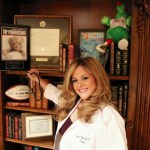In a long overdue action, the U.S. Food and Drug Administration (FDA) is informing consumers about the hazards of benzocaine-containing over-the-counter (OTC) oral health products which are typically used by parents for infants and young children to manage teething discomfort. The announcement conveys the agency is warning companies if they continue to sell it or market it to this population, then they will be subject to regulatory measures.
FDA Commissioner Scott Gottlieb, M.D. goes on to state:
“The FDA is committed to protecting the American public from products that pose serious safety risks, especially those with no demonstrated benefit...Because of the lack of efficacy for teething and the serious safety concerns we’ve seen with over-the-counter benzocaine oral health products, the FDA is taking steps to stop use of these products in young children and raise awareness of the risks associated with other uses of benzocaine oral health products. In addition to our letters to companies who make these products, we urge parents, caregivers and retailers who sell them to heed our warnings and not use over-the-counter products containing benzocaine for teething pain. We will also continue working with Congress to modernize our over-the-counter drug monograph regulatory framework as part of our mission to protect and promote public health.”
Benzocaine is used in OTC medications as a topical local anesthetic to relieve pain associated with sore gums, teething, sunburn, bites, mouth ulcers etc. In this pronouncement, the FDA is targeting the oral health products that include it especially when used in young children, in general, but for those under age 2 years in particular. Not only are they ineffective for teething since they expeditiously wash out of the mouth, but they can do significant harm triggering a condition known as methemoglobinemia. This consequence impairs oxygen from getting to vital tissues. When severe, it can be fatal. There have been deaths and serious adverse effects requiring medical treatment as a result of the development of this condition from these products. (To review the FDA warnings and recommendations, see here).
Pediatricians have not been recommending these remedies for years. In young children especially, it can be challenging to quantify what they actually ingest as they spit out medicines and caregivers may double dose when this happens. Teething is a natural growing pain that has to happen and medications are unnecessary. With time, the fluctuations with teething discomfort subside.
Part of the problem is that we, as a society, pathologize normal development. This makes medicating the event seem reasonable when in reality time, massaging of the gums or intermittent use of an appropriately selected teething ring more than suffice. You may recall that the FDA has been down this road with belladonna-containing homeopathic teething products. This perception that because something says it is “homeopathic” must mean it is safe is a faulty one. Belladonna is a poison.
Last January, the FDA advised parents to stop using and immediately discard certain homeopathic teething products for infants because they contain belladonna, a toxic chemical in amounts that cannot be verified as safe. Their findings revealed inconsistent and sometimes excessive levels of the poison in such products. The FDA recalled them recognizing they had no proven health benefits nor had they been approved for safety and efficacy. Consumers were urged to seek immediate medical care if their child experienced “seizures, difficulty breathing, lethargy, excessive sleepiness, muscle weakness, skin flushing, constipation, difficulty urinating, or agitation after using homeopathic teething products.”
Speaking to your child’s own pediatrician about OTC or prescription medications before their use is the safest bet. The same holds true for you and your physician. But, most importantly, appreciating that just because something says it is OTC does not make it automatically safer than prescription. The reverse holds true too. Labels like “natural” or “homeopathic” or “pain reliever” don’t magically deem a product preferable to certain “artificial” ones. Knowing a person’s clinical status, medical history and the exact ingredients of a product, OTC or otherwise, are the most relevant tools to determine safe and effective use by an experienced, well-informed medical professional.

